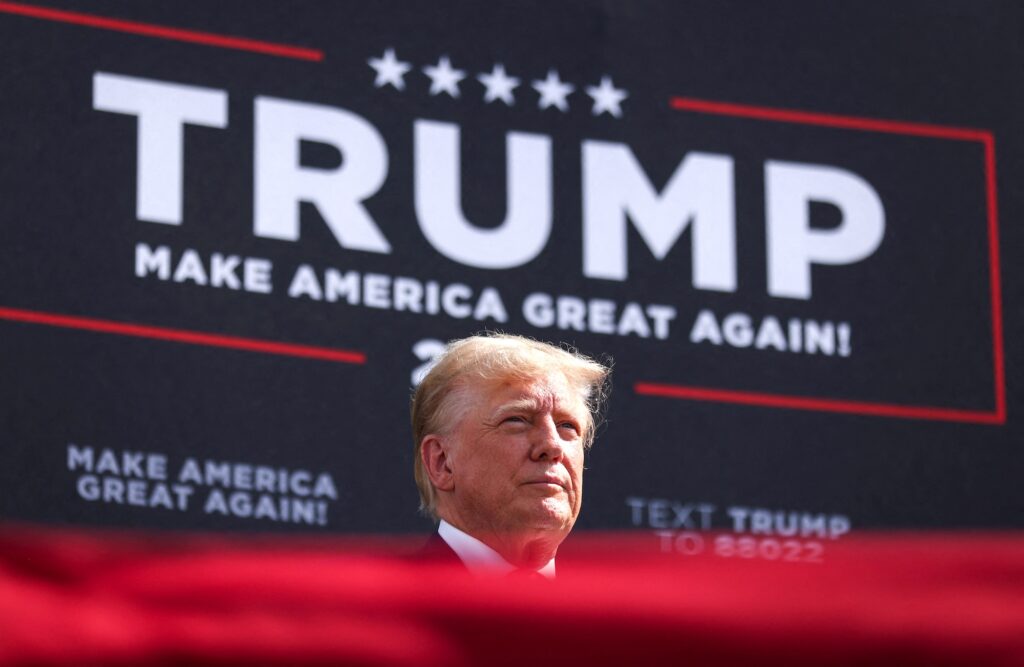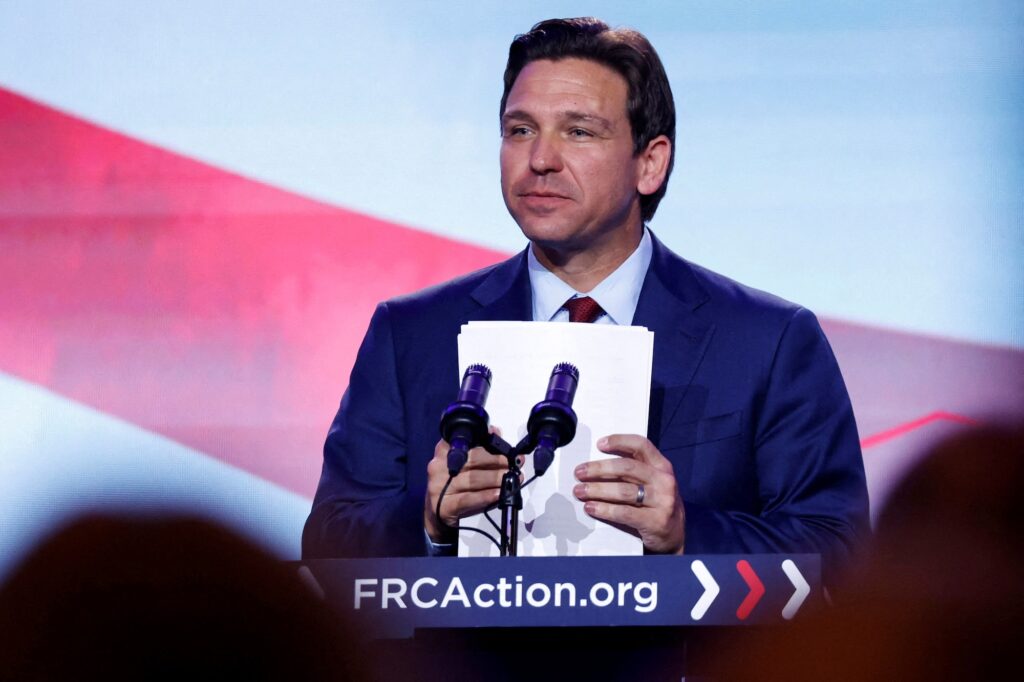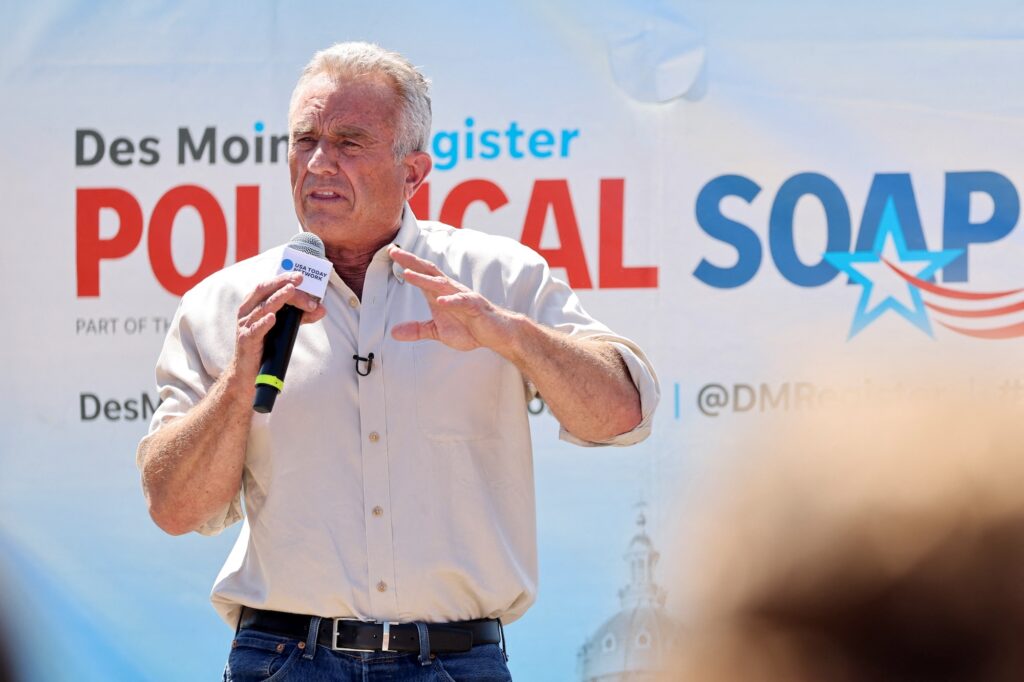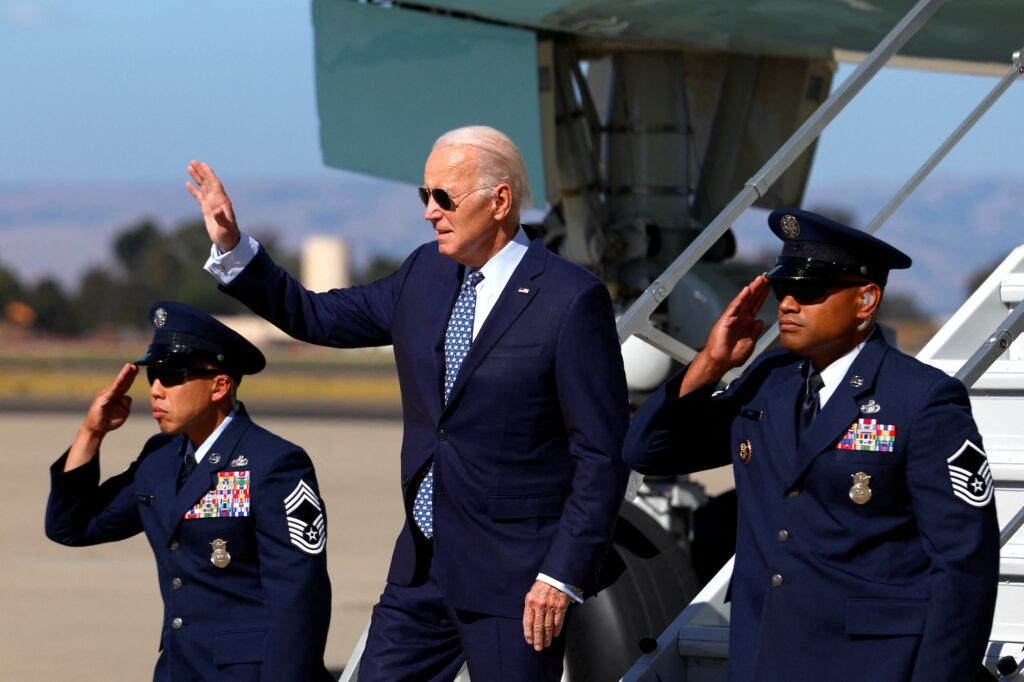What you need to know about the 2024 US presidential election

Former US President and Republican presidential candidate Donald Trump attends a 2024 US presidential election campaign event at Sportsman Boats in Summerville, South Carolina | Photo by Sam Wolfe/Reuters
Washington (Reuters) – The 2024 US presidential election promises to be like no other modern US election.
Leading the field of Republican presidential candidates is former President Donald Trump, who faces a battery of federal and state criminal charges related to his efforts to overturn his 2020 election loss to Democrat Joe Biden.
If Trump captures the Republican nomination and wins the general election, he will become the first president in 130 years to win the White House after sitting out a four-year term, after Grover Cleveland.
Biden, the incumbent president, is the presumptive Democratic nominee. He will be 81 when the election is held in November 2024, making him the oldest American to win a presidential election should he secure a second term.
Who are the Republican candidates running for president?
Trump, 77, is dominating a large field of candidates who have largely avoided criticizing him for his actions related to the 2020 election for fear of alienating his base of diehard supporters. Many of those supporters believe Trump’s false claims that the election was stolen from him.
His Republican rivals, such as Florida Governor Ron DeSantis and former US Ambassador to the United Nations Nikki Haley, instead have argued that Trump’s legal woes will hamstring him in a general-election fight against Biden.

Florida Governor and Republican presidential candidate Ron DeSantis addresses the Pray Vote Stand Summit, organized by the Family Research Council in Washington | File photo by Jonathan Ernst/Reuters
Two notable exceptions are Trump’s former vice president, Mike Pence, and former New Jersey Governor Chris Christie, who have both condemned Trump’s attempts to subvert the 2020 election outcome.
Entrepreneur Vivek Ramaswamy, a newcomer to politics, is running as an inheritor of Trump’s populist, America First agenda, one that is wary of an expansive federal government, corporate power, and international alliances.
DeSantis was once viewed as the most likely candidate to deny Trump the nomination, but his campaign has sputtered since launching in May despite having a big war chest. He risks falling into the rest of the pack behind Trump.
Opinion polls show that Trump is largely tied with Biden in head-to-head matchups, with voters concerned about Biden’s age and his handling of the economy despite job growth, infrastructure investment, and a slow easing of inflation after last year’s peak.
Trump faces indictments in four cases in federal and state courts for his efforts to undermine the 2020 election, his mishandling of classified documents, and his involvement in a “hush money” scheme involving a porn star. He has maintained his innocence and argued that he is the victim of politically motivated prosecutions, an assertion the Biden administration denies. The legal calendars for those cases pose obstacles for Trump’s ability to campaign.
Who are the Democrats running for US president in 2024?
While voters may not be enthusiastic, Democratic leaders are backing Biden and his vice president, Kamala Harris.
Self-help author and speaker Marianne Williamson is mounting a long-shot challenge to Biden, but no established Democrat has entered the race.
Biden’s pitch for a second four-year term rests on his stewardship of the economy as it has emerged from the COVID-19 pandemic, and what he calls the “battle for the soul of America,” a fight against Trump-aligned Republicans.
Under Biden, unemployment dropped to generational lows, gross domestic product (GDP) grew faster than expected, and wages have risen. However, inflation spiked last year, and, while it has eased in recent months, voters remain concerned about the high price of staples such as food, fuel, cars, and housing.
Should Trump be the Republican nominee, much of Biden’s campaign is likely to focus on warning voters that Trump poses a mortal threat to American democracy.
Who are the independent candidates at the 2024 US presidential election?

Democratic presidential candidate Robert F. Kennedy Jr. delivers his political soapbox speech at the Iowa State Fair in Des Moines, Iowa | Photo by Scott Morgan/Reuters
Robert F. Kennedy, Jr., scion of the famed American political family and an anti-vaccine activist, has launched an independent bid rather than challenge Biden for the Democratic nomination. Kennedy has shown some appeal among both Republicans and Democrats unenthused about another Biden-Trump match-up.
Progressive activist Cornel West has also said he will run as an independent. The challenge for both candidates will be amassing enough support to land on the ballot in all 50 states next year.
When do the 2024 primaries start?

US President Joe Biden waves after arriving at Moffett Federal Airfield in Mountain View, California | Photo by Evelyn Hockstein/Reuters
Republicans will hold their first nominating contest in January with the Iowa caucuses. New Hampshire will hold a more traditional presidential primary shortly thereafter, followed by Nevada, South Carolina, and Michigan.
Democrats plan to hold their first primary in South Carolina in February, with Biden not expected to face a serious challenger. “Super Tuesday”—when more than a dozen states will award delegates to the party conventions, including California and Texas—will be on Mar. 5.
Each party will nominate the candidate who receives the most delegates at their nominating conventions in the summer of 2024. Republicans will hold their convention in Milwaukee, Wisconsin, while Democrats will stage theirs in Chicago.
The general election will be held on Nov. 5, 2024.
What are the key issues?
Abortion
Democrats plan to make abortion central to their 2024 campaign, with opinion polls showing most Americans don’t favor strict limits on reproductive rights. The issue has become more motivating to those who support abortion rights than to those who oppose them, and the party is hoping threats to those rights will encourage millions of women and independents to vote their way next year.
The issue has divided Republicans, with some leaders concerned the party has gone too far with state-level restrictions since the US Supreme Court overturned the landmark 1973 Roe v. Wade ruling last year, ending constitutional protection for abortion.
Republican presidential candidates are split between those saying abortion laws should be left to the states and those supporting a national ban.
The economy
Biden’s White House is trying to reassure Americans that the economy is in solid shape, with inflation slowing and unemployment at its lowest levels in a half-century.
Republicans say they will cut federal spending, which they blame for stoking inflation and triggering consumer-price spikes, trim back federal regulations, and lower taxes.
Democrats argue the economy is healthy, wages are up, and investments in infrastructure are producing long-term job gains.
Voters remain unconvinced. A Reuters/Ipsos poll in September found that 27 percent of Biden’s 2020 voters said their finances were “weaker” than they were before the pandemic, compared with 28 percent who said they were “better” and 42 percent who said they were “about the same.”
Immigration
Since taking office in 2021, Biden has grappled with record numbers of migrants caught illegally crossing the US-Mexico border, straining resources there and cities they have gone to, such as New York and Chicago. Republican candidates, including Trump, have blamed Biden for reversing more restrictive Trump-era policies, and have pledged to step up border security.
Some Democrats have criticized Biden for turning to Trump-style enforcement measures to reduce illegal crossings, while the White House maintains it is moving to a more humane and orderly system by offering new ways for migrants to enter legally.
Crime
Violent crime remains at higher levels across the nation than in 2019, the year before the COVID-19 pandemic and unrest over racial justice. Americans of both parties are concerned, with 88 percent of respondents in a September Reuters/Ipsos poll saying crime would be an important issue for determining who gets their vote.
Foreign policy
China has emerged as the foreign policy issue in the campaign, with Republicans arguing the Asian power is a growing threat to national security, US corporate interests, and Taiwan’s independence.
The Biden administration has said it wants to “de-risk” and not “de-couple” its relationship with China and work to keep the competition between the world’s No. 1 and No. 2 economic powers from escalating into conflict.
Ukraine is another major issue, and has split the Republican field. Trump and DeSantis argue that Biden’s support of Ukraine in its war with Russia is distracting the US from preparing for a possible confrontation with China. Other Republican candidates, such as Pence and Haley, say the United States must continue to back Ukraine.
Biden, who has focused on rebuilding relations with allies after Trump’s presidency, has helped build an international coalition to help Ukraine fight Russia, and will likely highlight the importance of maintaining that policy on the campaign trail.
After the October attack by Hamas on Israel, Republicans criticized Biden’s recent deal with Iran, which backs Hamas, to free US citizens held there.
What are the key states in the 2024 US presidential election?
That both parties are holding their conventions in the Midwest says much about the value they are placing on Michigan, Pennsylvania, and Wisconsin, all of which went for Trump in 2016 and flipped to Biden in 2020.
Arizona, Georgia, and Nevada have also proven to be closely divided and contain growing populations that could determine the next election. Another key battleground next year could be North Carolina, another Southern state with an increasingly diverse electorate.
(Reporting by James Oliphant, additional reporting by Ted Hesson and Heather Timmons, editing by Ross Colvin, Kieran Murray, Jonathan Oatis and Cynthia Osterman)

